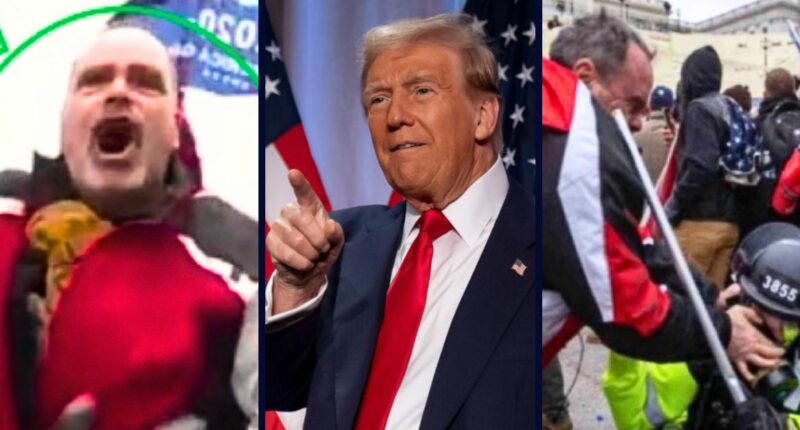Share this @internewscast.com
Left: Thomas Webster allegedly preparing to strike a police officer with a flagpole during the January 6 incident (FBI). Center: President-elect Donald Trump attends a House GOP meeting, Wednesday, Nov. 13, 2024, in Washington (AP Photo/Alex Brandon). Right: Thomas Webster allegedly attempting to remove a police officer’s face shield on January 6 (FBI).
A former U.S. Marine and NYPD officer, who brutally attacked a police officer at the Capitol on January 6, using a metal flagpole while shouting obscenities like “you f—ing commie f—,” and trying to gouge out the officer’s eyes, has had his Freedom of Information Act (FOIA) request for details about the victim denied.
U.S. District Judge Christopher Cooper pointed out in his ruling on Tuesday that Thomas Webster — convicted in May 2022 for assault and resisting an officer with a dangerous weapon, and whose appeal was denied — had been fully pardoned by President Donald Trump upon taking office in January. As such, Webster no longer has a pending case that would require access to the requested information.
“Webster may have sought the records for his failed appeal,” Cooper, appointed by Barack Obama, stated. “However, he has continued to pursue litigation even after receiving a full pardon alongside other convicted January 6th rioters in January 2025.”
In a FOIA request to the FBI made in 2023, Webster sought “[a]ll investigation notes and documentation regarding Officer Noah Rathbun [victim] … about any incidents on May 24, 2021,” possibly to bolster an appeal, according to court documents. He did not provide a privacy waiver from Rathbun or any third party, leading the FBI to reject his request with a neutral response that neither confirmed nor denied the records’ existence.
Webster filed a lawsuit against the FBI in January 2024 to contest their denial and tried to “revise his FOIA request” to gather details about an unrelated shooting involving Rathbun on May 24, 2021, federal prosecutors indicated. Webster argued his intent was to “contribute information to the public domain” regarding FBI procedures and investigative processes; however, the Justice Department and Judge Cooper found this unconvincing.
“Plaintiff’s interest in Officer Rathbun is personal,” wrote the DOJ in a Jan. 22 filing. “Plaintiff’s request does not even mention the shooting incident at all because its focus is on Officer Rathbun,” prosecutors charged. “The Court should find Plaintiff’s attempt to re-word his FOIA request during litigation unpersuasive.”
And that’s exactly what happened on Tuesday.
Cooper said Tuesday that acknowledgement of the files “would reveal nothing about FBI investigations” in the way Webster argued.
“Had Webster wanted to contribute to public understanding of the FBI’s operations or activities, in line with the purpose of FOIA, he could have requested non-individualized reports from a range of investigations,” the judge explained.
“Webster chose a single purported investigation into an incident that does not appear to have generated much public interest; targeted a specific individual (who so happened to have been a victim of Webster’s assault and testified against him at trial); and failed to explain how the information would offer any insight into broader FBI investigation practices,” Cooper concluded. “The public interest in his narrow request is therefore minimal and cannot, under any burden, override the significant privacy interest at issue.”
As Law&Crime has previously reported, Webster was sentenced to 10 years in September 2022 after he claimed to act in self-defense. An appeals court in Washington, D.C., unanimously rejected arguments of juror bias that he tried to advance in May 2024.
Webster, who represented himself, could not be reached for comment Thursday by Law&Crime.
















